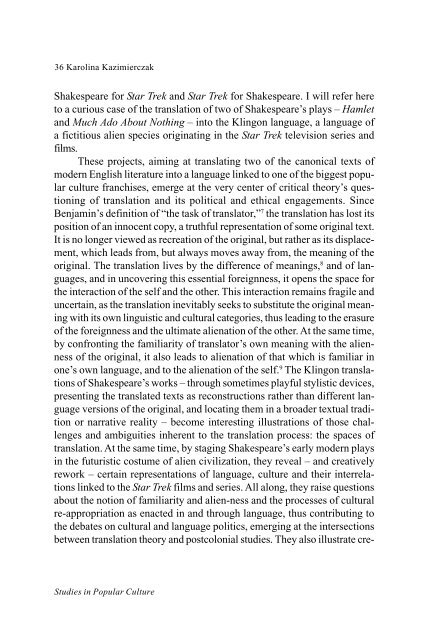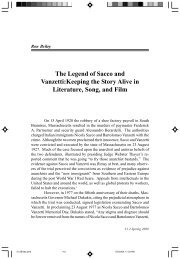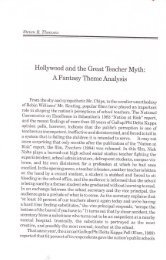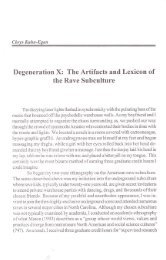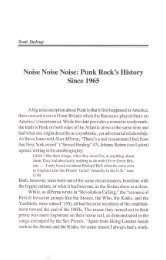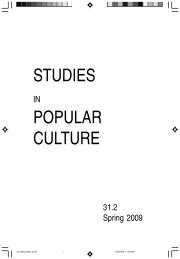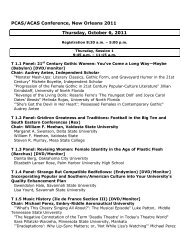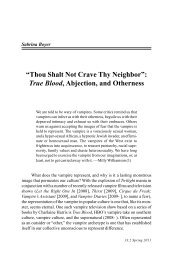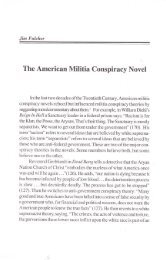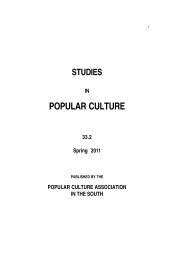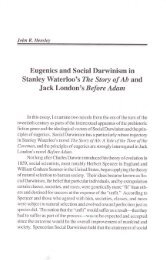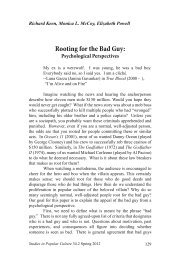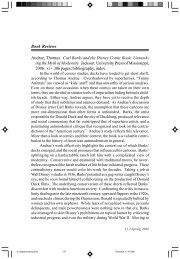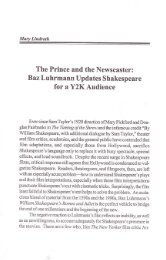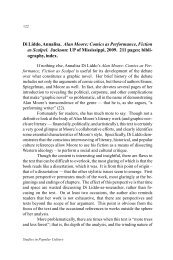Adapting Shakespeare for Star Trek and Star Trek for Shakespeare ...
Adapting Shakespeare for Star Trek and Star Trek for Shakespeare ...
Adapting Shakespeare for Star Trek and Star Trek for Shakespeare ...
Create successful ePaper yourself
Turn your PDF publications into a flip-book with our unique Google optimized e-Paper software.
36 Karolina Kazimierczak<br />
<strong>Shakespeare</strong> <strong>for</strong> <strong>Star</strong> <strong>Trek</strong> <strong>and</strong> <strong>Star</strong> <strong>Trek</strong> <strong>for</strong> <strong>Shakespeare</strong>. I will refer here<br />
to a curious case of the translation of two of <strong>Shakespeare</strong>’s plays – Hamlet<br />
<strong>and</strong> Much Ado About Nothing – into the Klingon language, a language of<br />
a fictitious alien species originating in the <strong>Star</strong> <strong>Trek</strong> television series <strong>and</strong><br />
films.<br />
These projects, aiming at translating two of the canonical texts of<br />
modern English literature into a language linked to one of the biggest popular<br />
culture franchises, emerge at the very center of critical theory’s questioning<br />
of translation <strong>and</strong> its political <strong>and</strong> ethical engagements. Since<br />
Benjamin’s definition of “the task of translator,” 7 the translation has lost its<br />
position of an innocent copy, a truthful representation of some original text.<br />
It is no longer viewed as recreation of the original, but rather as its displacement,<br />
which leads from, but always moves away from, the meaning of the<br />
original. The translation lives by the difference of meanings, 8 <strong>and</strong> of languages,<br />
<strong>and</strong> in uncovering this essential <strong>for</strong>eignness, it opens the space <strong>for</strong><br />
the interaction of the self <strong>and</strong> the other. This interaction remains fragile <strong>and</strong><br />
uncertain, as the translation inevitably seeks to substitute the original meaning<br />
with its own linguistic <strong>and</strong> cultural categories, thus leading to the erasure<br />
of the <strong>for</strong>eignness <strong>and</strong> the ultimate alienation of the other. At the same time,<br />
by confronting the familiarity of translator’s own meaning with the alienness<br />
of the original, it also leads to alienation of that which is familiar in<br />
one’s own language, <strong>and</strong> to the alienation of the self. 9 The Klingon translations<br />
of <strong>Shakespeare</strong>’s works – through sometimes playful stylistic devices,<br />
presenting the translated texts as reconstructions rather than different language<br />
versions of the original, <strong>and</strong> locating them in a broader textual tradition<br />
or narrative reality – become interesting illustrations of those challenges<br />
<strong>and</strong> ambiguities inherent to the translation process: the spaces of<br />
translation. At the same time, by staging <strong>Shakespeare</strong>’s early modern plays<br />
in the futuristic costume of alien civilization, they reveal – <strong>and</strong> creatively<br />
rework – certain representations of language, culture <strong>and</strong> their interrelations<br />
linked to the <strong>Star</strong> <strong>Trek</strong> films <strong>and</strong> series. All along, they raise questions<br />
about the notion of familiarity <strong>and</strong> alien-ness <strong>and</strong> the processes of cultural<br />
re-appropriation as enacted in <strong>and</strong> through language, thus contributing to<br />
the debates on cultural <strong>and</strong> language politics, emerging at the intersections<br />
between translation theory <strong>and</strong> postcolonial studies. They also illustrate cre-<br />
Studies in Popular Culture


